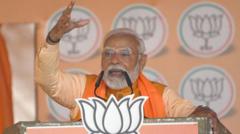In a historic election outcome, Prime Minister Modi’s BJP has achieved a decisive victory in Delhi, unseating the Aam Aadmi Party which had governed the capital since 2013. This victory not only reignites the BJP's stronghold in India's capital but also raises questions about the future prospects of the AAP and highlights the backdrop of climate-related discussions that shaped the campaigning landscape.
BJP's Resounding Victory in Delhi Election Marks Political Shift

BJP's Resounding Victory in Delhi Election Marks Political Shift
The Bharatiya Janata Party secures a significant win in the Delhi elections, breaking a 27-year streak of Aam Aadmi Party’s governance, amidst challenges faced by both parties in a climate-focused election campaign.
In a remarkable electoral turnaround, the Bharatiya Janata Party (BJP) has won a significant number of seats in the Delhi assembly elections, indicating a seismic shift in the city's political landscape. The party, led by Prime Minister Narendra Modi, is poised to form the government in Delhi, marking a departure from the Aam Aadmi Party (AAP) that enjoyed governance for nearly a decade.
As per the latest data from the Election Commission of India, the BJP has secured or is leading in 47 of the 70 seats. In contrast, the AAP—once heralded for its welfare policies and focus on education and healthcare—has only managed leads in 23 constituencies. This election was not just a contest for majority but represented a pivotal moment for both parties, given the symbolic prestige attached to ruling the national capital.
With over 60% voter turnout, the election was a damaging blow to AAP’s credibility, particularly as its leaders have faced significant controversies, including corruption allegations which they have vehemently denied. The AAP had enjoyed significant support among the city's middle-class voters, initially attracted by its anti-corruption stance, but this support waned under the weight of governance fatigue and allegations against prominent figures like Arvind Kejriwal and Manish Sisodia.
Modi celebrated the victory on social media, emphasizing themes of development and governance, while the BJP's campaign claimed it would address key issues like air quality, a topic notably underrepresented in campaign discussions despite Delhi’s notorious pollution crisis. In addressing climate challenges, the BJP pledged to halve the city’s Air Quality Index (AQI) by 2030.
Political analysts suggest that this victory can contribute to Modi's resurgence in popularity among voters, especially following setbacks experienced in previous elections. The implications for the AAP are profound, as this defeat raises critical questions about its direction and appeal among constituents.
The governance structure in Delhi, where significant decisions are often under the purview of the federally appointed lieutenant governor, presents unique challenges for any ruling party. Today's result adds additional complexity to the existing political dynamics, especially as the BJP’s grasp on Delhi may exert influence on the national stage in the forthcoming electoral cycles.
As Delhi embarks on a new political era, both parties must navigate the dual challenges of addressing pressing governance issues and responding effectively to the concerns of an electorate increasingly focused on environmental sustainability.
As per the latest data from the Election Commission of India, the BJP has secured or is leading in 47 of the 70 seats. In contrast, the AAP—once heralded for its welfare policies and focus on education and healthcare—has only managed leads in 23 constituencies. This election was not just a contest for majority but represented a pivotal moment for both parties, given the symbolic prestige attached to ruling the national capital.
With over 60% voter turnout, the election was a damaging blow to AAP’s credibility, particularly as its leaders have faced significant controversies, including corruption allegations which they have vehemently denied. The AAP had enjoyed significant support among the city's middle-class voters, initially attracted by its anti-corruption stance, but this support waned under the weight of governance fatigue and allegations against prominent figures like Arvind Kejriwal and Manish Sisodia.
Modi celebrated the victory on social media, emphasizing themes of development and governance, while the BJP's campaign claimed it would address key issues like air quality, a topic notably underrepresented in campaign discussions despite Delhi’s notorious pollution crisis. In addressing climate challenges, the BJP pledged to halve the city’s Air Quality Index (AQI) by 2030.
Political analysts suggest that this victory can contribute to Modi's resurgence in popularity among voters, especially following setbacks experienced in previous elections. The implications for the AAP are profound, as this defeat raises critical questions about its direction and appeal among constituents.
The governance structure in Delhi, where significant decisions are often under the purview of the federally appointed lieutenant governor, presents unique challenges for any ruling party. Today's result adds additional complexity to the existing political dynamics, especially as the BJP’s grasp on Delhi may exert influence on the national stage in the forthcoming electoral cycles.
As Delhi embarks on a new political era, both parties must navigate the dual challenges of addressing pressing governance issues and responding effectively to the concerns of an electorate increasingly focused on environmental sustainability.




















